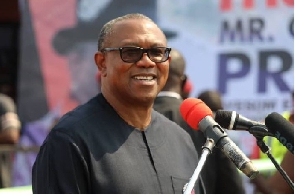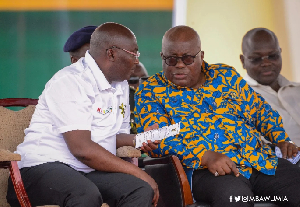Ghana and Nigeria share a long history that goes back centuries, with overlapping cultures, a good dose of rivalry, and sometimes a diplomatic tug of words.
Whilst the debate about which of the two countries is home to the best jollof remains a complex maze, even after Senegal has been crowned as the home of the best jollof, one cannot overlook the common heritage both Ghana and Nigeria share.
The umbilical cords of these two nations are intricately embedded with each other to the extent that there is always something Nigerian about Ghana and vice versa. For instance, the Nigerian dish (or more appropriately the Yoruba delicacy) Amala may just be the Ghanaian version of Kokonte.
Nigerians fancy their fufu with Agushie stew whilst Ghanaians drool over their fufu with Abunabuna or Light Soup. The Hausa people in Northern Nigeria and people of northern Ghana (Zongos inclusive) cannot go without their Tuozaafi or Shinkafa da wake.
Even though Shatta Wale and Burna Boy may have their scores to settle and the lyrical war between Mama Naira and Big Ivy is unending, Black Sherif’s Kwaku the Traveller still blasts from stereos in Port Harcourt and Ikeja whilst Kizz Daniel’s Buga cannot be missing on the playlist at every Ghanaian wedding reception or pubs along the Oxford Street in Accra.
And there have been times when the elasticity of the relationship between these countries has been stretched to a breaking point. In 1969, Kofi Abrefa Busia’s regime enacted the Aliens Compliance Order which saw thousands of Nigerians deported from Ghana. In what may look like a reprisal attempt, the Shehu Shagari regime also issued an Executive Order in 1983 that saw Ghanaians and other nationals deported in droves in what birthed the infamous term, “Ghana Must Go.”
When it comes to football, a clash between the Super Eagles and the Black Stars always invokes jitters between the two nations. And perhaps Nigerians may still be groaning in pain for the defeat the Super Eagles suffered at the hands of the Black Stars which crushed their 2022 World Cup dreams.
The two nations may be behaving like two women in a polygamous marriage but one thing that is clear is that when one sneezes, the other catches a cold. Whether it’s “charlie how be” or “Omo, how far now”, the vibe between the two nations is stronger than a romantic affair.
But I’ll leave for another day a fuller commentary on this extraordinary love/hate affair between these West African siblings brewed and served through the funnel of a long history. For now, let’s cruise on a journey to understand the upcoming Nigeria elections.
Africa’s most populous nation brittles with multiple challenges such as violent insurgencies, banditry, corruption, unemployment, run-away inflation, and bulging youth unemployment.
Nigeria is dense and diverse with over 300 ethnic groups but sharply divided geographically into three major blocs of North, East, and West. The north is predominantly defined by the Hausas, while the East is dominated by the Igbos and the West by the Yorubas.
On religious grounds, the north is predominantly Muslim with the East being mainly Christian whilst the Yorubas are a mix of Muslims and Christians.
The tension or if you like the suspicion between the Igbo people and the Hausa people dates back to pre-colonial times but in order not to obfuscate matters, let’s concern ourselves with events in the colonial era.
The Hausa people traditionally operate a centralized system that revolves around the emir. For this reason, the British colonial explorers faced little to no resistance when they went to northern Nigeria to establish its indirect rule system. This cordial relationship between the British and the Hausa people was so strong that the Hausas were even taken to other regions including outside of Nigeria to perform policing duties for the British. It’s in that light that the first police force established in the Gold Coast was known as the Hausa Constabulary at some point.
It’s also the reason why Ghana has a population of Hausa people as citizens. They’re made up largely of people brought to Gold Coast by the British but refused to return to their indigenous home country of Nigeria after Ghana’s independence. Since every person who lived in Gold Coast prior to Kwame Nkrumah’s Declaration of Independence is automatically Ghanaian, they also became citizens.
On the other hand, the Igbo people, just like some ethnic groups in Ghana like the Kusasi people, did not operate a chieftaincy system when the British arrived and therefore opposed strongly the indirect rule system brought by the British colonial establishment. This opposition to the British later contributed to the cause of the Biafra war where the largely Igbo East wanted to secede from Nigeria.
Some Igbo analysts or if you like conspiracy theorists feel that the British colonial administration, in their Solomonic wisdom, intentionally balkanized Nigeria in a way that they could hand it over to the Hausa people as compensation for their loyalty to British rule and also ensure they could still micromanage Nigeria even after independence.
So, the majority of political leaders in Nigeria so far have come from the north because of ethnic dynamics.
Enough of the history lessons, let’s turn our attention to the upcoming elections. There are as many as 18 candidates who are seeking Nigeria’s highest office but the three leading candidates are Alhaji Bola Tinubu of the ruling All Progressives Congress (APC), Atiku Abubakar of the People’s Democratic Party (PDP), and Peter Obi of the Labour Party (LP).
If the Nigeria elections were held on social media, it would be a safe bet for any analyst to predict that Peter Obi is the presumptive winner because of the massive reception he has enjoyed from Nigeria’s social media freak-bulging youth. Already some polls have predicted victory for him even though others like the Economist Intelligence Unit (EIU) predict that Tinubu is likely to win. The Igbo man is enjoying a lot of popular support for a number of reasons;
At age 61, Peter Obi is seen as relatively young (compared to Tinubu 70, and Atiku 76), and represents the change that most Nigerian youths are yearning for in a country that has a large youth population.
The ethnic tension between the Igbo people of the East and the Hausa in the north is so glaring for any analyst to ignore. The Igbo people regard themselves as the most highly educated and enterprising people in Nigeria yet feel they have been sidelined in the governance of the country. Apart from Nnamdi Benjamin Azikiwe, all the leaders of Nigeria have been non-Igbos.
Even though former president Goodluck Jonathan comes from the Eastern part of Nigeria but he is not an Igbo and he is also seen as an outlier because he became president following the demise of his former boss, Umaru Musa Yar’Adua.
Others also say that Port Harcourt (located in the East or Igbo land) should have been the commerce hub of Nigeria but was sidelined in favor of Lagos (in the west or Yoruba land) after the Biafra war in an attempt to slow down the progress of the East.
Some Igbo people also argue that even though the Eastern part of Nigeria is home to Nigeria’s oil-rich States, the governance of Nigeria has over the years been in the hands of predominantly the northerners who use their political influences to enrich themselves with the oil wealth.
Therefore, the overarching sentiment shared by especially many Igbo people is that Peter Obi represents that opportunity to have another Igbo man lead Nigeria and give the Igbo people their pride of place in the governance architecture of Nigeria and restore their lost glory.
The former running-mate to Atiku Abubakar is also seen to have a balanced ticket that satisfies the two dominant religions in Nigeria. Mr. Peter Obi’s running-mate, Yusuf Baba-Ahmed, a former senator from Kaduna State is seen as a masterstroke that heals a country polarized and battered by religious and ethnic tensions.
Atiku Abubakar is predicted to suffer some losses in the Eastern part of Nigeria where the PDP used to enjoy some level of support when Peter Obi was the running mate of Atiku Abubakar. The former vice president under Olusegun Obasanjo is also facing stiff competition from the ruling APC in the north of the country.
This is because, in an unprecedented move, the APC has a Muslim-Muslim presidential ticket, and given that the north has traditionally been an APC stronghold, it may not favor Atiku Abubakar and his PDP.
These dynamics coupled with Peter Obi’s youthful charm puts him in a pole position for this year’s election but whether he can wriggle power out of the old guards of Nigerian politics, it is only time that will tell.
Politics in Nigeria just like it’s in the rest of Africa is complex like buying an iPhone at Kwame Nkrumah Circle in Ghana. It takes a lot of careful maneuvering and prayers, or else one may end up with a bar of soap neatly wrapped and disguised as an iPhone. May the person with the right intentions for Nigeria wins.
As the last stanza of the Nigerian national anthem says;
“Oh God of creation, direct our noble cause
Guide our leader’s right
Help our youth the truth to know
In love and honesty to grow
And living just and true
Great lofty heights attain
To build a nation where peace and justice shall reign.”
Whatever happens on February 25, may Nigeria continue to remain one piece with peace.
Africa News of Friday, 3 February 2023
Source: Abdul-Karim Mohammed Awaf

















